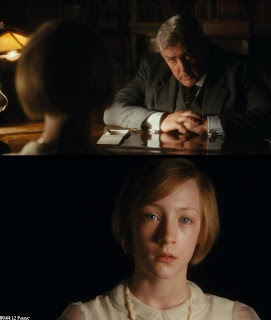Younger, imaginative, precocious sister has a crush on gardener. Gardener loves the older, wiser, level-headed sister. Younger sister sees gardener and older sister doing it. Younger sister thinks it is rape. Later, a house guest is actually raped by someone. Younger sister with the crazy imagination concludes that it is the gardener and becomes a tattle-tale. Gardener is sent to war to fight. Love is put on hold. Lives change forever. Everyone cries and some people die.
I should win a Pulitzer for that.
Anyways, if you haven't seen the movie, go and see it because it is so good. I have the DVD; you can totally borrow it.
Director Joe Wright is brilliant at employing POV in order to heighten the effect of Briony's imagination. In the first few scenes of the film, Wright uses the first person POV when we see an incident through the eyes of Briony:

The audience sees what she sees and we immediately see her own reaction to what she had just seen. We can interpret what she is thinking through her facial expressions: confusion, intrigue, gossip, etc.
Later on, Wright employs the omniscient POV to inform the audience of the reality of the situation:

In these screenshots, the camera work is subtle and always still, to give the impression that we are observing what is going on. Thus, as the article stated, we are given "a comprehensive exposure to the people and events depicted in the work" (208).
Here is the clip of that scene:
In the middle of the movie, Wright also employs the second person POV during Briony's testimony:

In this scene, the camera goes from third-person POV to second-person POV. We take the role of the interrogator and Briony tells us that she, in fact, "sawhrrr him."
"You sawhhrr him? You know it was him?"
"I sawhrr him. Yes, I sawhrr him with my own eyes."
Finally, I want to refer to the ending of the film, which I considered to be an amazing final scene. In my intepretation, I viewed it as utilizing first-person and second-person and third-person POVs, because we were observing the interview, experiencing older Briony's thoughts and viewing her reasoning while we simultaneously take on the role of the interviewer hearing her confessions.

In this riveting, final scene, we see the transition from third-person POV to second-person POV when the area around Briony's visage turns to pitch black and when she is, of course, looking straight into the camera as if staring at us. Thus, we take on the role of the interviewer as if she were answering our question.
This final scene uses a camera shot which the article mentions called the gaze (207). We see the scene transition from second-person POV to first-person POV when Briony confesses to fabricating things for the sake of a happy ending for Robbie & Cecilia and sharing her general feelings about her past. As the scene progresses and cuts to Briony, the shot's proximity lessens and lessens until we are left a fierce close-up of her face. Indeed, she is talking to us and she is exposing her "mental state."
No comments:
Post a Comment